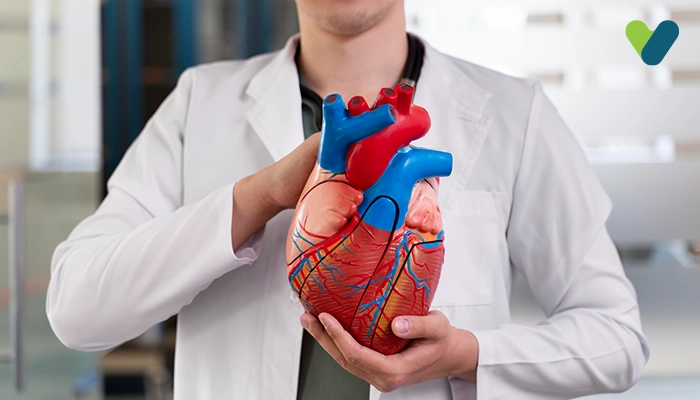The most severe kind of AV heart block is complete heart block also known as third-degree heart block. When the electrical impulses that signal your heart when to beat don't flow between the top (atria) and bottom chambers (ventricles) of your heart, it causes a heart attack.
The blood flow to your body and brain may be affected as a result of this. Your heart will beat slowly or miss beats as a result of this, and your heart will be unable to effectively pump blood. Electrical signals from the top chambers of the heart (atria) to the lower chambers are not conveyed in third-degree heart block (ventricles).
As a backup, the signaling system in the lower chambers may take over, but it is ineffective. The heartbeat of those with a third-degree heart block is usually quite slow. Their heart is ineffective at transporting blood throughout the body.
Symptoms are frequently present. Complete heart block is a term used to describe a third-degree heart block.
Top 4 Symptoms of Third-Degree Heart Block
Complete heart block can cause the following symptoms:
- Feeling dizzy or faint
- Tired and sometimes confused.
- Sense of pressure or pain in the chest
- Shortness of breath
There are occasions when there are no signs or symptoms at all.
Potential Causes of Third-Degree Heart Block
Heart attacks are the most common cause of heart block. Other causes include heart muscle disease (cardiomyopathy), heart valve dysfunction, and structural abnormalities with the heart. Damage to the heart during open-heart surgery, as a side effect of some drugs, or exposure to toxins can all induce heart block. Another factor to consider is genetics.
3 Best Ways for Heart Block Diagnosis
Your doctor will go over your medical history and family medical history before asking you questions about your overall health, diet, exercise level, and symptoms. You'll also be asked if you smoke or use drugs, as well as any medications you're taking. Your doctor will listen to your heart and examine your heart rate during your physical exam. Fluid buildup in your feet, ankles, and legs will also be evaluated for indicators of heart failure.
An electrophysiologist may be recommended by your doctor. Physicians that specialize in the electrical activity of the heart are known as electrophysiologists. You may be subjected to the following tests:
Treatment for Heart Block ?
Your cardiologist will examine how heart block (its type, location, and severity) affects your heart's capacity to function, as well as your symptoms, to decide the best treatment options for you. Symptoms and treatments differ from one person to the next. Heart block can sometimes be relieved by taking medication or therapy modifications for heart problems. Heart block in the third degree is frequently discovered during an emergency circumstance. A pacemaker is nearly usually used as part of the treatment. If you require a pacemaker, your cardiologist or electrophysiologist will go over the details with you, including the best type for you and what to expect before, during, and after the procedure.
Tips for Prevention of Heart Block
Heart block can be hereditary in some situations (present at birth). However, the majority of heart block occurs after birth. Some causes are unavoidable. We also know that the chance of heart block, as well as heart disease, increases with age. Some types of heart disease can be avoided. You can take the following steps to keep your heart and body as healthy as possible:
- Eat a heart-healthy diet, exercise regularly, get an adequate amount of sleep each night, reduce stress, limit alcohol, and avoid smoking and using illicit substances to live a heart-healthy lifestyle.
- Consult your doctor about examining your prescriptions and other supplements to see if any of them affect the normal amounts of potassium, calcium, and magnesium in your body, which play a part in your heart's system. If necessary, your doctor can switch your medication to a different drug class.


